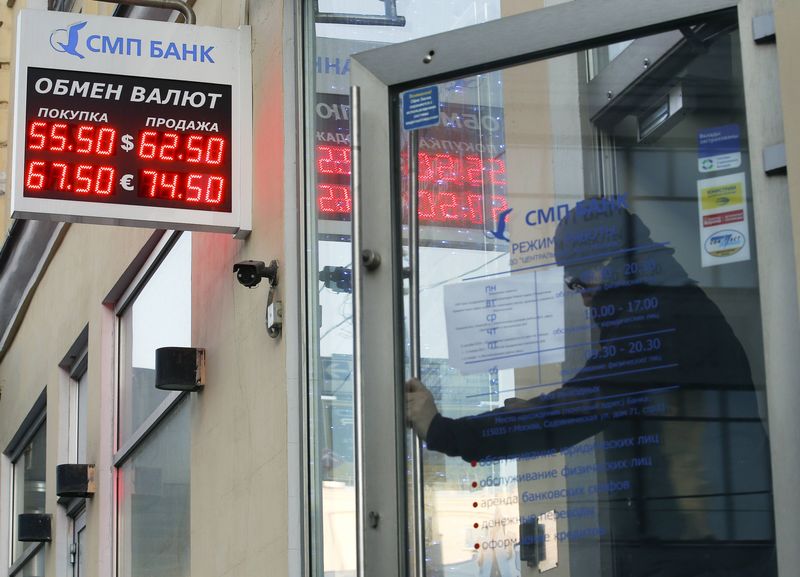By Kira Zavyalova and Jason Bush
MOSCOW (Reuters) - Russia's central bank will hold its main lending rate at 17 percent when it meets on Friday, even though the economy is likely to contract by 4.2 percent this year, a Reuters poll predicted on Thursday.
The bank jacked the rate up in mid-December at an emergency meeting provoked by a run on the rouble, as sliding oil prices and Western sanctions linked to the Ukraine conflict sparked financial turmoil.
An escalation of fighting in eastern Ukraine is adding to the economic pressures, with the European Union warning this week that further sanctions against Russia are planned.
"The economy is heading toward a recession in 2015," said ING economist Dmitry Polevoy. "Double-digit inflation is another evil that is not likely to ease its grip quickly."
Out of 12 analysts polled by Reuters, 11 expected the central bank to hold its key rate this month, with one predicting a one-point cut.
"I don't think we'll have any change in rates either tomorrow or for at least a couple of months," said BCS economist Vladimir Tikhomirov. "We find ourselves in a cycle of rising inflation."
A majority of analysts also expected the bank to hold rates until at least the end of the first quarter, but the poll predicted a reduction to 15.5 percent in the second quarter.
The central bank has said that it is unlikely to cut rates until inflation is on a clear downward trend. Inflation has instead been shooting up as a result of the slide in the rouble.
The poll predicted that inflation would reach 13.3 percent in January and 14.9 percent by the end of the first quarter, with full-year inflation for 2015 at 11 percent.
High inflation and interest rates are set to exacerbate a severe economic contraction. The poll predicted that gross domestic product would shrink by 4.2 percent in 2015, compared with last month's forecast of a 3.6 percent contraction.
Official data this week showed real wages slumped by 4.7 percent year-on-year in December, with real disposable income falling by 7.3 percent, as inflation cuts into pay packets.
"We expect to see a collapse in retail sales. Besides that, against the background of a crisis in confidence and a sharp rise in the cost of credit, companies are evidently freezing or curtailing investment plans," said Otkritie economist Darya Isakova.

Analysts nevertheless expect the rouble to strengthen gradually during the year from its recent slump, reaching 67 per dollar in a month's time, and 55 by the end of 2015, compared with around 69.3 rubles per dollar today.